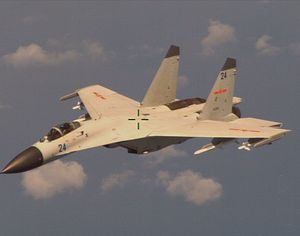The U.S. and China continue to trade barbs over U.S. surveillance near Chinese coasts.
As The Diplomat has covered closely, the U.S. and China have been in a spat ever since a Chinese pilot conducted what the U.S. characterized as a “dangerous intercept” of a P-8 surveillance plane that was flying in international airspace around 100 miles off the coast of China. China denied that a “dangerous intercept” occurred, insisting that its pilot acted professionally. Beijing blamed America’s surveillance near China’s coasts for any close calls that might take place. It used this opportunity to once again demand that the U.S. significantly scale back or altogether halt its surveillance activities. Following China’s denial, U.S. officials told reporters off the record that there have been a number of similar near misses between U.S. and Chinese aircraft this year, all around the same area above the South China Sea. Both sides also announced that Chinese military officials would visit Washington at the end of last month to discuss the situation with their American counterparts.
Those talks do not appear to have helped much, as the U.S. and China continued to trade barbs over the surveillance flights. On Monday, Chief of Naval Operations Admiral Jonathan Greenert spoke about the U.S. Navy’s posture in Asia at the Carnegie Endowment of International Peace in Washington, DC. According to Breaking Defense, Greenert devoted his opening remarks to the importance of strengthening maritime partnerships throughout Asia, including with China. He did not mention the near collision with the PLAAF pilot during his prepared remarks.
However, during the Q&A session that followed, multiple reporters from Chinese state media outlets asked the admiral about the recent incidents, the“dangerous intercepts” of U.S. Navy spy planes. Greenert expressed concern that similar incidents will happen in the future; however, he also emphasized that the U.S. has no plans to reduce or stop its surveillance flights near China, as Beijing has demanded.
“There is no intention that I am aware of to do that. We are flying in international airspace,” Greenert said, China Daily reported. “We’ll continue to operate in international airspace. We made that clear and we’ll proceed ahead.” The top naval officer also pointed out that, “China comes and steams in our Exclusive Economic Zone, we don’t make a big deal out of it.”
Nevertheless, Greenert characteristically focused primarily on the potential for cooperation between the Chinese and U.S. militaries. For one thing, he said that the dispute over surveillance flights should not define the mil-to-mil relationship. He also noted that he has met with his Chinese counterpart, PLA Navy Commander Admiral Wu Shengli, more times than any other foreign navy chief, and that they would meet again later this month at the Naval War College.
China appeared to respond to Greenert’s comments on Tuesday at the end of National Security Advisor Susan Rice’s three day trip to China. Specifically, in a press conference with Rice, Gen. Fan Changlong, vice chairman of the Central Military Commission and one of the top officers in the PLA, urged the U.S. to “decrease and even end close-in ship and aircraft surveillance of China.”
Fan also told Rice that the U.S. should take a correct view of China’s military rise. “We hope the U.S. can promote the healthy development of new China-U.S. military ties with concrete actions,” state media quoted Fan as saying. “The U.S. should view the normal development of the Chinese military in a correct manner.”
Other Chinese officials were more upbeat, however, including President Xi Jinping, who met with Rice on Tuesday. “It has become more important than ever for China and the United States to work with each other as the international situation continues to undergo profound and complex changes,” Xinhua quoted Xi as saying. “”China and the United States should increase dialogue, enhance mutual understanding, and respect and take care of each other’s core interests and major concerns to appropriately address disputes and reduce friction.”
Xi also noted that “there are many sectors where China and the United States should and can cooperate.”

































